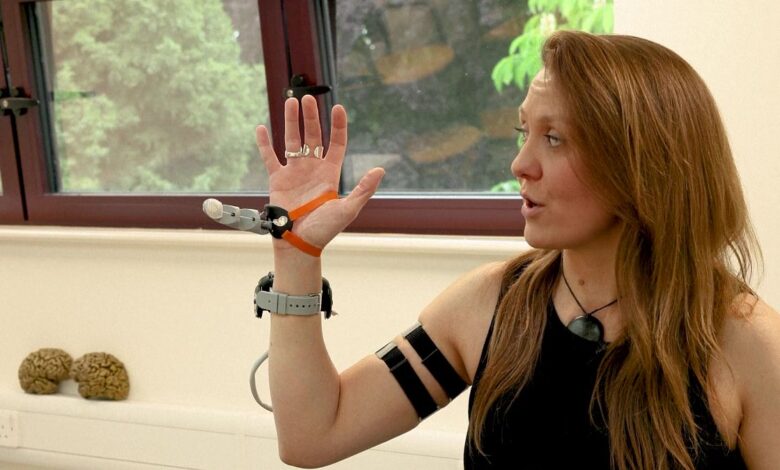This robotic thumb is designed to help you enhance productivity at work

Nearly 600 members of the public tested the device, with just four unable to use it at the Royal Society Summer Science Exhibition in 2022.
Scientists have successfully developed a new, controllable prosthetic extra thumb designed to enhance productivity.
Researchers at Cambridge University say the robotic thumb can help expand the capacity of the human hand, from carrying multiple beverage glasses and shuffling playing cards to performing surgery.
“We are also really excited about potential opportunities of using the thumb to enhance productivity in work settings, especially those that are relying on their hand’s manual dexterity in order to accomplish their work,” said Tamar Makin, a professor of cognitive neuroscience at the University of Cambridge.
“This can be anywhere between manual labourers that are trying to solder a complicated kit or even surgeons that have to negotiate between many instruments at the same time,” she added.
In 2022, the third thumb was showcased at the Royal Society Summer Science Exhibition where nearly 600 members of the public tested the device.
Just four were unable to use the robotic thumb either because it did not fit their hand securely, or because they were unable to control it with their feet.
The research team explains the pressure sensors developed specifically for the exhibition were not suitable for very lightweight children.
Tasks included picking up pegs from a pegboard and manipulating objects in a short time frame.
According to the results published in Science Robotics in May, “98 per cent of participants were able to successfully manipulate objects using the extra thumb during the first minute of use, with no significant influences of gender, handedness, or affinity for hobbies involving the hands”.
How does it work?
Researchers are optimistic about the possible applications of the third thumb, extending them to highly skilled professional environments.
“This is a technology that is specifically designed for able-bodied people, people with two hands, five fingers, to allow them to do more with their hands,” Makin said.
“We’re trying to break beyond the flesh and blood limitations of our own body and allow you to interact with the world in a completely new way,” he added.
The research team says the third thumb is controlled by a pressure sensor placed under each big toe or foot.
Pressure from the right toe pulls the third thumb across the hand, while the pressure exerted with the left toe pulls the thumb up toward the fingers.
The extent of the third thumb’s movement is proportional to the pressure applied.
Dani Clode, the developer of the third thumb, says the device is easy to use.
“Any tool that we learn to use in our daily lives requires a little bit of training and experience within the context of our day. The thumb is no different but what’s really exciting about the thumb is that it seems really complex from the beginning and it’s really no,” said Clode.
She added that people can use it in a minute, without it taking years to learn.
The research team says the robotic device could also offer support to those who need it.
“Even though the thumb is designed for able-bodied people, we can easily envisage situations where people with disabilities could enjoy or benefit from the extra help of the thumb so we’re trying to build the thumb as an alternative to traditional assistive technology,” said Makin.
Researchers hope that with further testing, the third thumb could redefine human capabilities.
For more on this story, watch the video in the media player above.
Video editor • Roselyne Min



